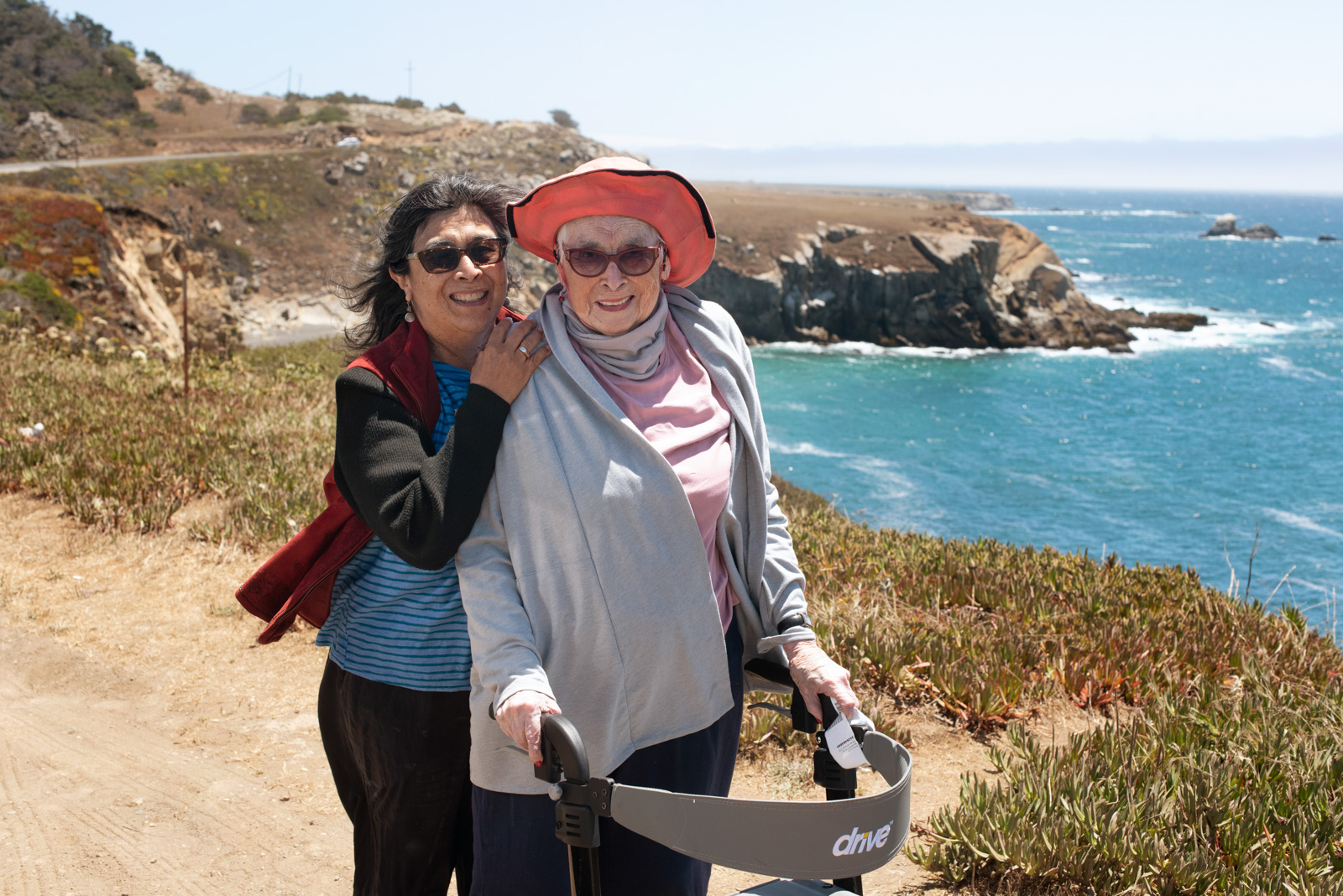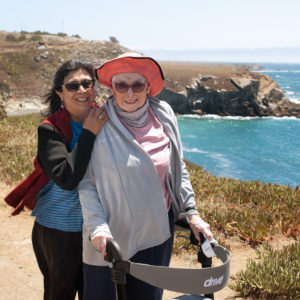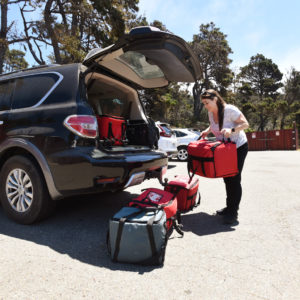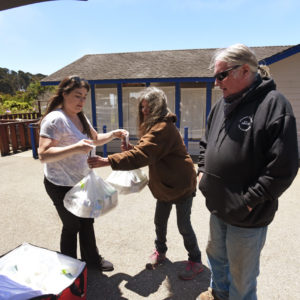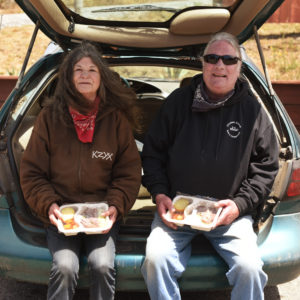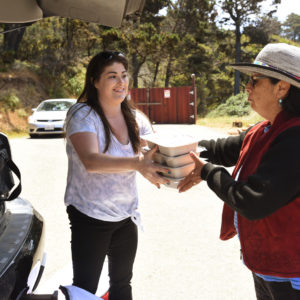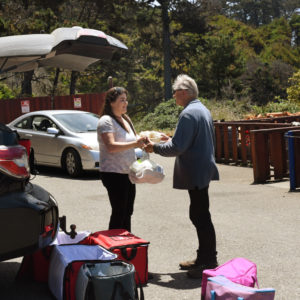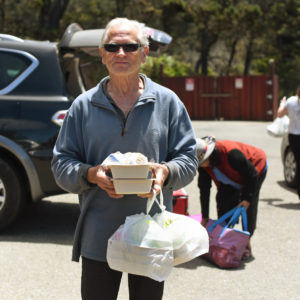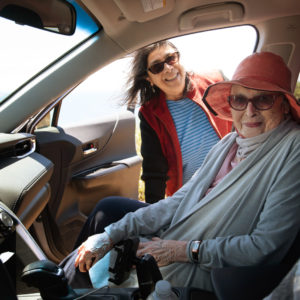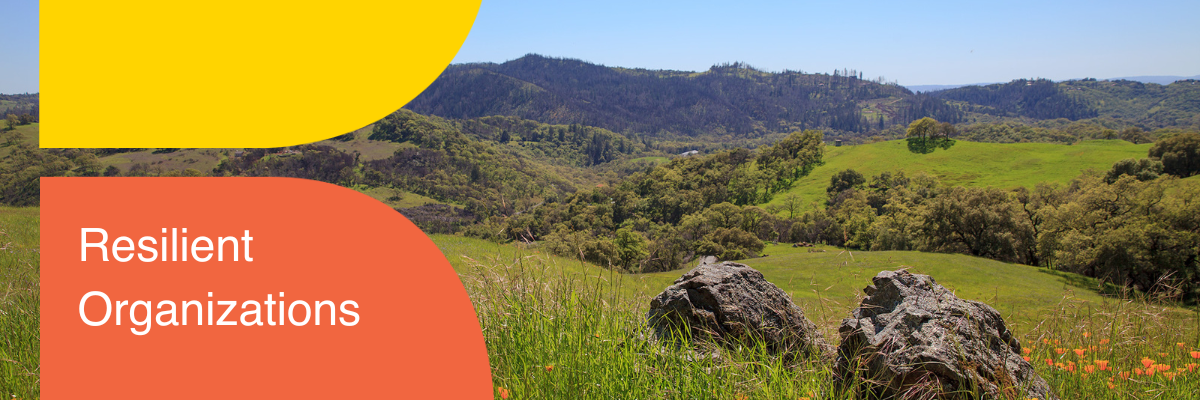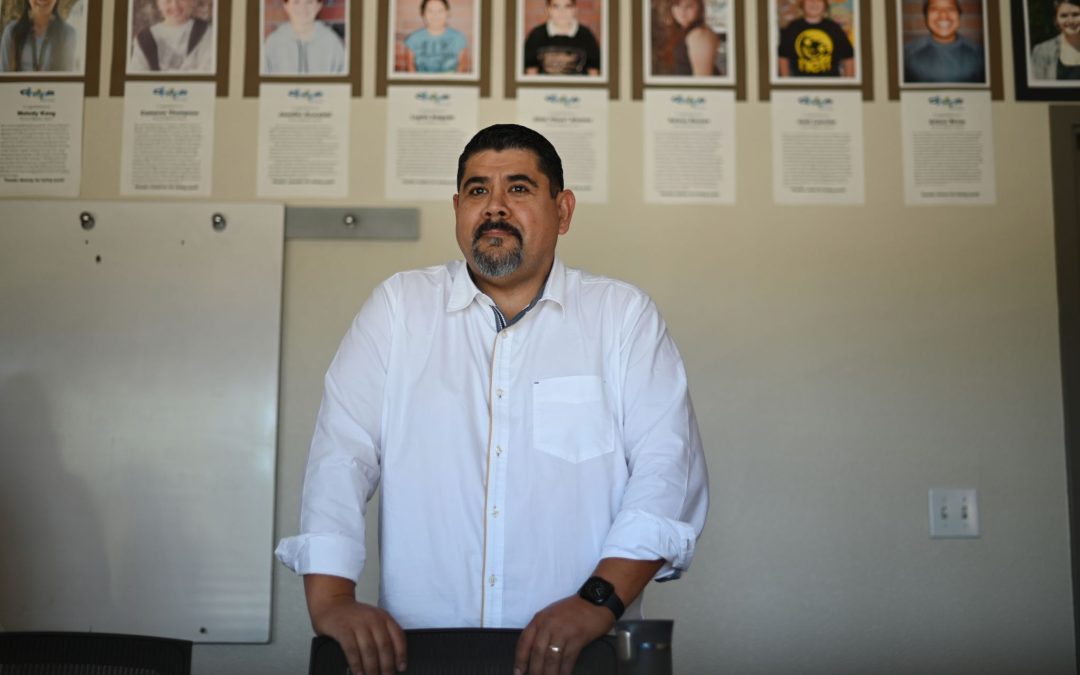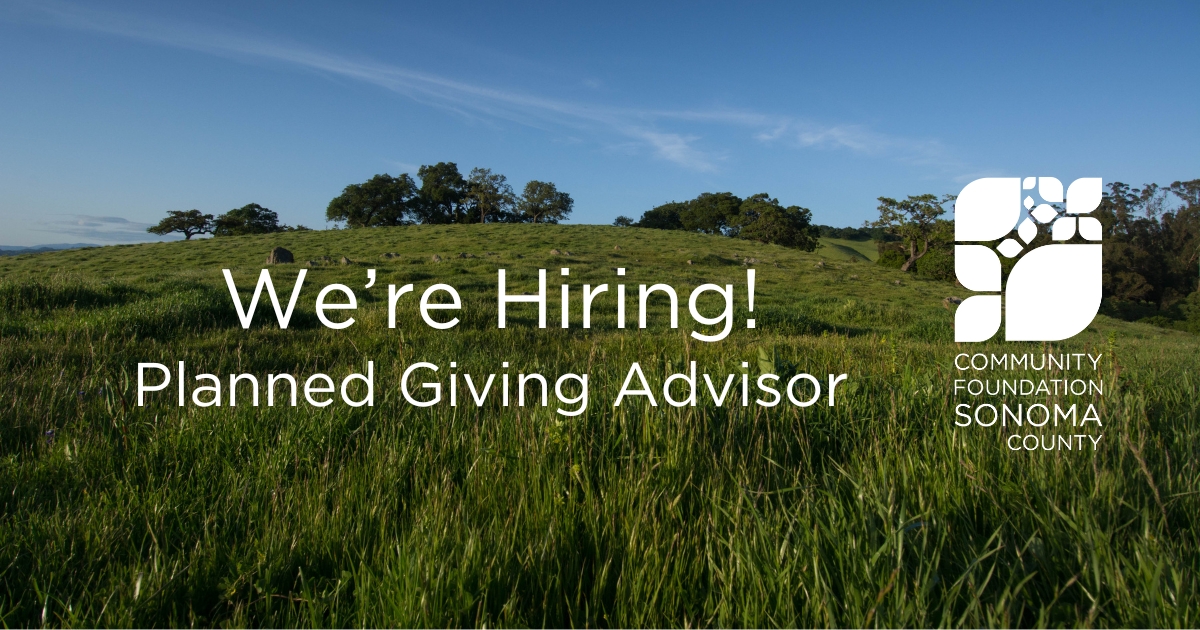For people living on the remote stretches of the North Coast of Sonoma County, it can be challenging to find social and other services. This reality, along with the sense of isolation that comes with rural living, was compounded while the nation sheltered-in-place during the first year of the coronavirus pandemic. Among the most isolated were seniors living in this far west region.
Coastal Seniors, a nonprofit organization based in Point Arena, ramped up its services to meet the growing needs of our isolated senior community.
Executive Director Nancy Gastonguay has been with Coastal Seniors for three years. She says the organization’s primary services include nutrition and transportation. They also provide mental health outreach, suicide prevention, and have a friendly visitors program to reduce some of the isolation of those living in the rural area.
- A small group of seniors that live in costal towns such as Cazadero and Timber Cove meet Micheline White who arrives in her SUV with coolers filled with hot meals once a week provided by Coastal Seniors at the Fort Ross Store in Fort Ross, California. Many seniors both pick up meals for themselves and grab a few meals that they deliver to fellow seniors unable to make it to the Fort Ross drop off. July 6, 2021. Photo by: © Erik Castro
- A small group of seniors that live in costal towns such as Cazadero and Timber Cove meet Micheline White who arrives in her SUV with coolers filled with hot meals once a week provided by Coastal Seniors at the Fort Ross Store in Fort Ross, California. Many seniors both pick up meals for themselves and grab a few meals that they deliver to fellow seniors unable to make it to the Fort Ross drop off. July 6, 2021. Photo by: © Erik Castro
- A small group of seniors that live in costal towns such as Cazadero and Timber Cove meet Micheline White who arrives in her SUV with coolers filled with hot meals once a week provided by Coastal Seniors at the Fort Ross Store in Fort Ross, California. Many seniors both pick up meals for themselves and grab a few meals that they deliver to fellow seniors unable to make it to the Fort Ross drop off. July 6, 2021. Photo by: © Erik Castro
- A small group of seniors that live in costal towns such as Cazadero and Timber Cove meet Micheline White who arrives in her SUV with coolers filled with hot meals once a week provided by Coastal Seniors at the Fort Ross Store in Fort Ross, California. Many seniors both pick up meals for themselves and grab a few meals that they deliver to fellow seniors unable to make it to the Fort Ross drop off. July 6, 2021. Photo by: © Erik Castro
- A small group of seniors that live in costal towns such as Cazadero and Timber Cove meet Micheline White who arrives in her SUV with coolers filled with hot meals once a week provided by Coastal Seniors at the Fort Ross Store in Fort Ross, California. Many seniors both pick up meals for themselves and grab a few meals that they deliver to fellow seniors unable to make it to the Fort Ross drop off. July 6, 2021. Photo by: © Erik Castro
- A small group of seniors that live in costal towns such as Cazadero and Timber Cove meet Micheline White who arrives in her SUV with coolers filled with hot meals once a week provided by Coastal Seniors at the Fort Ross Store in Fort Ross, California. Many seniors both pick up meals for themselves and grab a few meals that they deliver to fellow seniors unable to make it to the Fort Ross drop off. July 6, 2021. Photo by: © Erik Castro
- A small group of seniors that live in costal towns such as Cazadero and Timber Cove meet Micheline White who arrives in her SUV with coolers filled with hot meals once a week provided by Coastal Seniors at the Fort Ross Store in Fort Ross, California. Many seniors both pick up meals for themselves and grab a few meals that they deliver to fellow seniors unable to make it to the Fort Ross drop off. July 6, 2021. Photo by: © Erik Castro
- A small group of seniors that live in costal towns such as Cazadero and Timber Cove meet Micheline White who arrives in her SUV with coolers filled with hot meals once a week provided by Coastal Seniors at the Fort Ross Store in Fort Ross, California. Many seniors both pick up meals for themselves and grab a few meals that they deliver to fellow seniors unable to make it to the Fort Ross drop off. July 6, 2021. Photo by: © Erik Castro
“And then take everything else that our seniors have questions or needs around,” says Gastonguay. “And we address that, too.”
Coastal Seniors serves the northern coast of Sonoma County and reaches into Southern Mendocino County, as well. Their service area stretches from the Irish Beach area near Manchester, south to Timber Cove, and inland about 20 miles, including Annapolis and The Kashia Band of Pomo Indians at the Stewarts Point Rancheria.
Of their programs, Meals on Wheels has been a big focus during the pandemic, particularly since their usual in-person dining programs in Point Arena and Gualala have been on hiatus to meet social distancing requirements. Coastal Seniors’ Meals on Wheels delivers about 630 meals to Sonoma County clients each month, a big jump from their pre-Covid number of 130 meals per month.
Community Foundation Sonoma County recently supported Coastal Seniors with funding to help their Meals on Wheels program thrive during the pandemic.
Because this program relies entirely on volunteers to get nutritious food out to the community, Coastal Seniors had to adapt quickly and make changes in their delivery methods to keep everyone safe from Covid. Drivers were retrained, mask-wearing was required, gloves were changed after every delivery, and when possible, meals were left outside instead of hand-delivered. Expanding their service area during Covid also led to some creative delivery tactics. Gastonguay describes implementing relay-style delivery for some clients, in which volunteer drivers will meet up with a second driver at a halfway point to hand off meals to be delivered to seniors’ homes.
For Coastal Seniors, delivering meals is just a starting point to ensuring that their senior clients are thriving and are safe.
“A huge component of the Meals on Wheels program is doing welfare checks,” says Gastonguay. “There was a balance between needing to maintain social distance while making sure that we’re continuing to do welfare checks and spending enough time with each client to ensure that they’re safe, that they’re eating, that they’re also just receiving some additional socialization. So many [clients] who were already isolated pre-COVID became more isolated after. We needed to make sure that our drivers are maintaining that face-to-face contact, spending an extra few minutes with each person just to try and make sure that from mental health and physical perspective that they were doing okay.”
Their program thrives on generosity, from donations to dedicated volunteers. Gastonguay says that some of Coastal Seniors’ volunteer drivers are often on the road for several hours. Some routes include rural dirt roads, and a lot of steep climbs. Clients who are able, drive to a food site and pick up the meals themselves.
Judy Rosales, 70, lives with her husband and 98-year-old mother on a rural 40-acre ranch in Cazadero. Their family is among many in the North Coast who began receiving meals from Coastal Seniors last year.
The social distancing guidelines left them feeling extremely isolated and Rosales was only leaving home once every six weeks or so to drive an hour to Sebastopol for groceries. Because Rosales lives five miles up a dirt road, Meals on Wheels is unable to deliver to her home. Instead, she makes the hour-long trip to Fort Ross to pick up the weekly meals for her family, as well as meals for another senior in her community. The weekly outing is something for her and others in the program to look forward to.
“To go pick up the meals every Tuesday was so important to us because it was a social thing,” says Rosales. “Even with everyone wearing masks, we got to see people and had something to look forward to. And so did my mother, even though she’s with us, she loved going out and going to the coast to the drop-off site at Fort Ross store.”
Rosales also commented on the high quality of food, which Gastonguay says is made from scratch.
During a recent meal pick-up, Rosales says she spoke with another client of the program who agreed that the food is great. As a relatively recent widower who lives alone, he told her that the weekly drive gives him a sense of purpose, and something to look forward to.
“It’s been such a valuable service to those of us living up here,” says Rosales.
Coastal Seniors suggests a voluntary contribution of $5.00 per meal for those who can afford to pay for the Meals on Wheels program. Those who cannot afford the full donation are asked to donate what they can; Rosales says she knows at least two recipients who contribute additional funds so others can receive meals free of cost. The program is truly a community-supported endeavor.
With grant funds from Community Foundation Sonoma County, Gastonguay says Coastal Seniors was able to keep Meals on Wheels thriving, even with the growing number of clients. The biggest expenses, she says, are food and mileage reimbursement for their drivers, because of wear and tear on their vehicles.
The funding is critical to our success,” says Gastonguay. “And knowing that we have supportive organizations like Community Foundation is one of the primary reasons that we can continue to operate. I just want to express how grateful we are as an organization for the support we’ve received this year.”
Story by Dani Burlison, photos by Erik Castro

